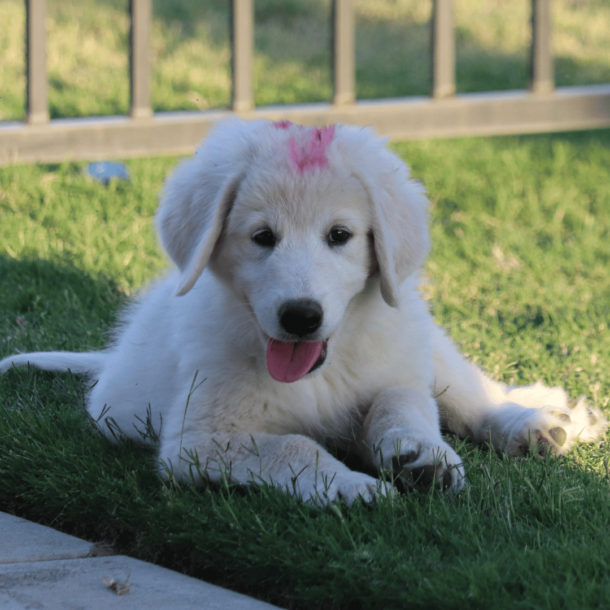Last Updated on October 25, 2025 by Kim Crawmer, KPA CTP, LFDM
Why Puppy Socialization Matters for LGDs
There’s a critical difference between dogs that work confidently with their families and those that become fearful liabilities.
One of the most damaging myths in the livestock guardian dog (LGD) world is that puppy socialization with humans will somehow “ruin” a working dog’s protective instincts. This misconception has led to countless under-socialized dogs that grow into management nightmares—fearful, aggressive, or impossible to handle when veterinary care or emergencies arise.
The truth? Proper human socialization doesn’t compete with livestock bonding—it enhances it.
A well-socialized LGD puppy grows into a confident, manageable, and still naturally protective guardian. Their instincts are written in their genetics, not erased by positive human interaction.
📚 LGD Puppy Development Series:
- Part 1: The Critical Window: Why early socialization makes or breaks your LGD
- Part 2: From Helpless to Hero: the Remarkable Journey of LGD Development
- Part 3: The Puppy Parlor Method: How We Raise and Socialize LGD Puppies
- Part 4: Puppy Socialization for LGDs: Why Human Interaction Builds Better LGDs
- Part 5: Livestock Integration for LGD Puppies: From Observation to Interaction
- Part 6: Building Immunity: The LGD Health Protocols That Protect Your Investment
- Part 7: Child Socialization for LGDs: Why it's Crucial for Family Farms
- Part 8: LGD Socialization: Meet Genny, the Maremma Mentor Who Perfects Every Puppy's Education
- Part 9: Beyond the Puppy Parlor: What Your LGD Needs Next
The Real Problem: Under-Socialization in Livestock Guardian Dogs
The vast majority of LGD problems stem from insufficient human socialization, not too much. I regularly consult with owners dealing with:
- Dogs that can’t be safely examined by veterinarians
- Animals that become aggressive during routine care
- Guardians that bite their owners during stressful situations
- Dogs that panic and become dangerous when they need to be moved or transported
- Animals so fearful of humans that they can’t function effectively as farm dogs
Sarah’s dogs from our Week 1 story? They likely suffered from both poor livestock socialization AND inadequate human socialization—a devastating combination.
These problems are preventable through proper early human exposure during the critical socialization window.

How LGD Genetics Protect Working Ability
Here’s what many people don’t understand: Well-bred livestock guardian dogs have centuries of genetic programming that naturally makes them wary of unfamiliar humans as they mature. This protective instinct develops regardless of puppy socialization.
Even the most human-socialized LGD puppy will:
- Become naturally protective as they mature
- Show appropriate wariness toward strangers
- Focus primarily on their livestock charges
- Maintain independence from human direction
What proper socialization creates is a dog that can distinguish between normal interactions (veterinary care, family members, routine management) and genuine threats.
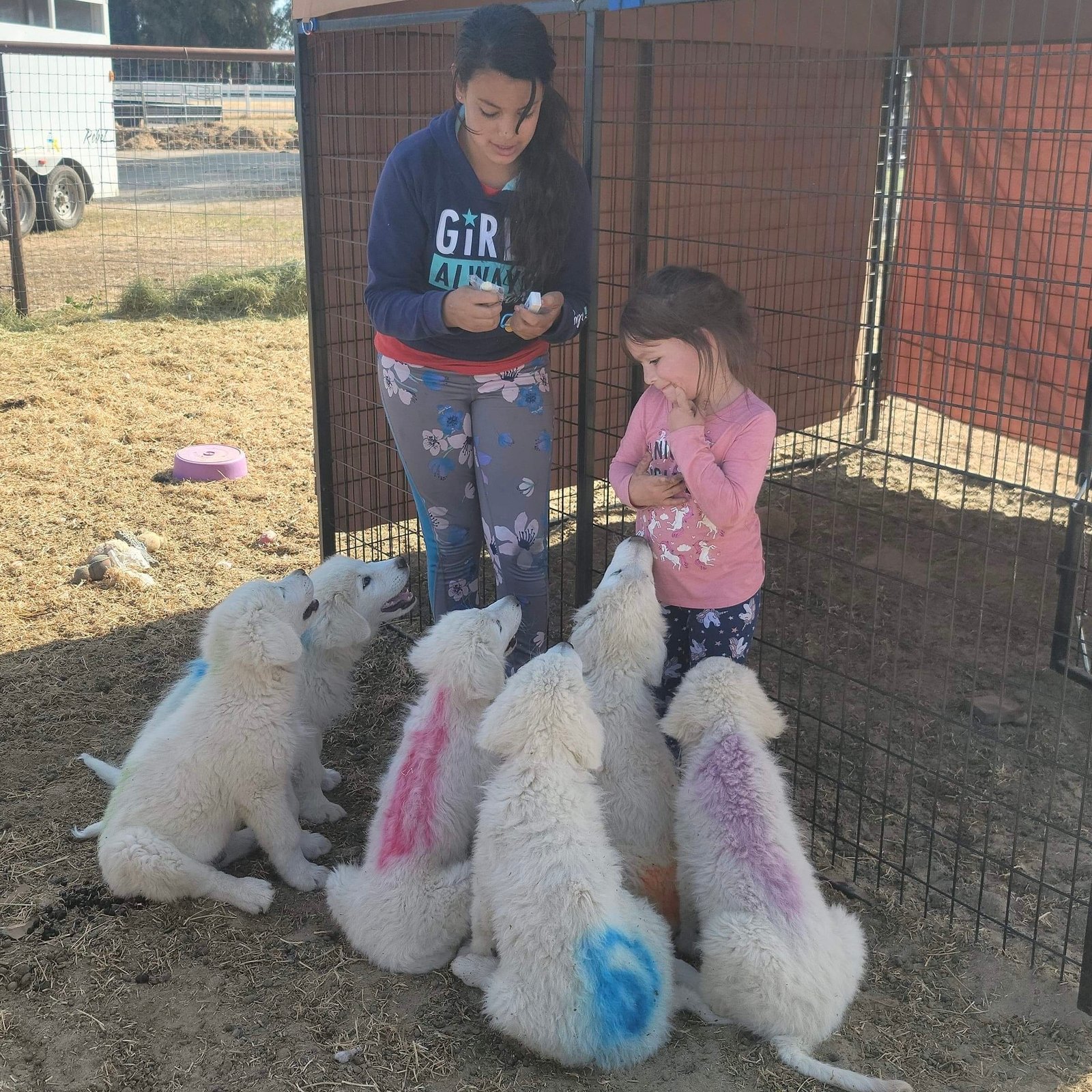
Where LGD Puppy Socialization Should Happen
The key isn’t limiting human interaction—it’s WHERE that interaction takes place.
Puppies raised in houses with occasional trips to “visit” livestock learn that houses and humans are home. When they’re eventually placed with livestock, they spend their time trying to get back to what feels normal: human companionship indoors.
I have seen this firsthand in Maremma puppies I acquired from breeders who raise their puppies in their homes and on their patios instead of in the barns and pastures like I do. When put with my goats, these puppies acted like ducks out of water and wanted nothing to do with the goats.
Our Maremma puppies live full-time with livestock and receive most of their human socialization in that environment. (Aside from occasional “field trips” to the vet or other public places.) They learn that human interaction is pleasant but secondary to their livestock-centered world.
This is the crucial difference.

Week 4 Puppy Socialization: Maximum Positive Human Exposure
At 4 weeks old, puppies are perfectly positioned for intensive human socialization. Their fear responses haven’t developed, making this the ideal time for building positive associations with people.
Daily Handling and Training for LGD Puppies
Our approach is the opposite of minimal—we maximize positive human experiences:
Multiple daily sessions that include:
- Extensive gentle handling (all body parts, positions, restraint)
- Using the “Puppy Call” and basic response training
- Introduction to clicker training and manding (once the puppies will take treats)
- Grooming and cooperative care simulations
- Exposure to a wide variety of experiences
But all of this happens in the puppy’s livestock environment, reinforcing that the barn and pasture are where good things happen.
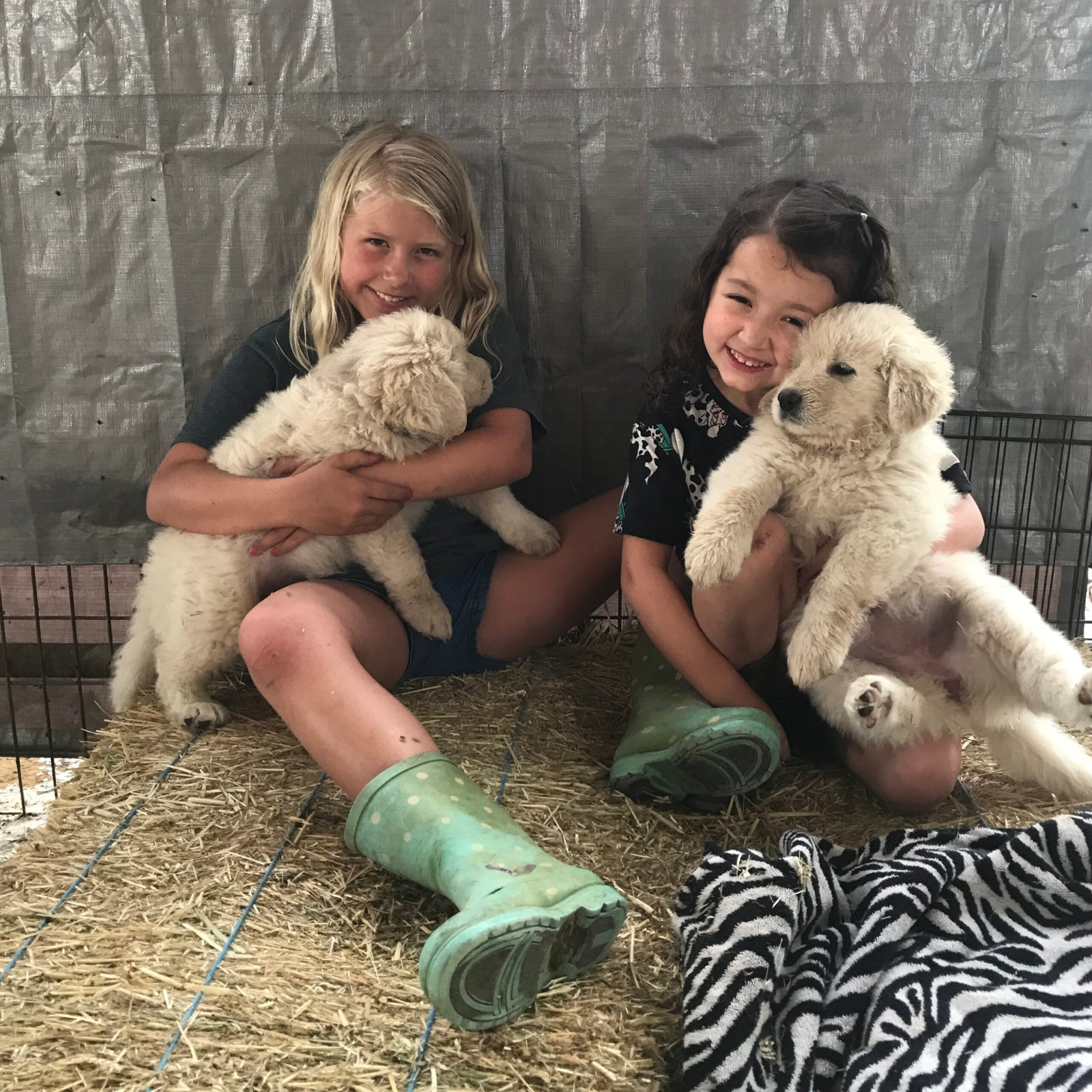
Visitor Socialization: Children and Trusted Adults
Starting at 4 weeks, we implement a structured visitor program:
Family Members: My grandchildren visit 1-2 times per week, providing crucial child socialization. Children move and behave differently than adults, so this exposure is essential for future safety around farm families.
Trusted Adults: Customers, friends, and other dog-experienced people visit regularly—ideally multiple times per week when possible.
Controlled Exposure: Each visitor follows specific protocols to ensure positive experiences without overstimulation.
Why This Matters: Puppies who meet only their breeder often become fearful of unfamiliar people later. Maximum positive human exposure during weeks 4-12 prevents this.

The “Enough Is Never Enough” Philosophy
When it comes to positive human socialization during the critical window, you literally cannot do too much. The more positive human experiences puppies have, the more confident and manageable they’ll be as adults.
Common fears about “over-socialization” actually lead to under-socialized dogs that:
- Become fearful or aggressive with veterinarians
- Can’t be safely handled during emergencies
- Require sedation for routine care
- May bite family members during stressful situations
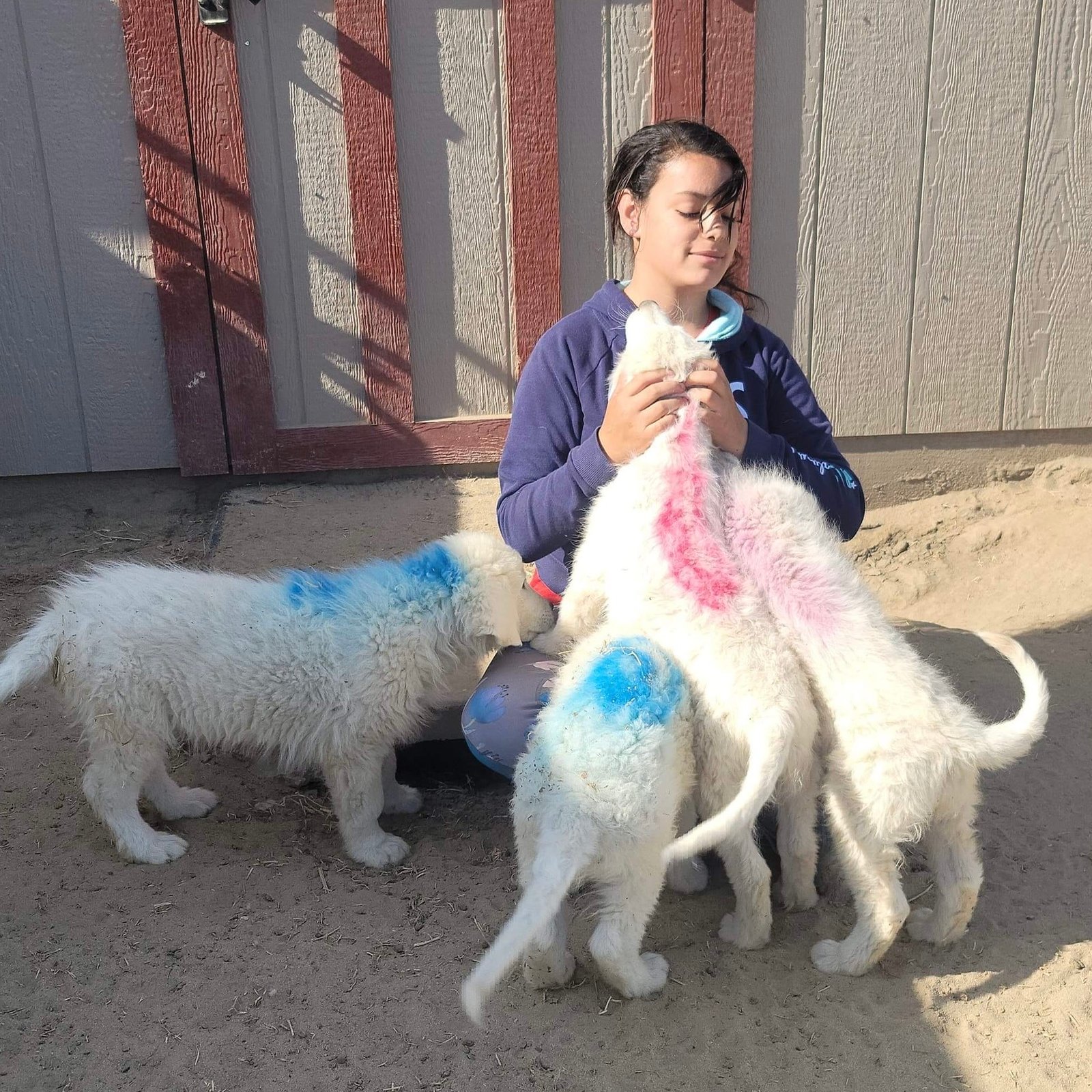
Environmental Enrichment for Confident LGDs
Human socialization extends beyond direct handling to environmental confidence:
Week 4+ enrichment includes:
- Various human-related sounds (power tools, vehicles, conversations, music, TV)
- Different human movements and activities around the puppies
- Exposure to human equipment and tools
- Car or golf cart rides and field trips (starting around 6-8 weeks)
- Exposure to different livestock on the farm
- Spending time with other Maremmas, besides mom
- Meeting other breeds of dogs (Our dogs and trusted friends’ and relatives’ dogs)
- Different locations while maintaining livestock connection
The goal is creating dogs that are confident in any situation they might encounter as working farm dogs.

The Natural Balance of Well-Socialized LGD Puppies
Here’s what happens when you do this right: Puppies grow into dogs that are:
- Happy to see their family when they come out to do chores (but equally happy to go back to work)
- Cooperative with necessary handling and veterinary care
- Confident around appropriate visitors without being attention-seeking
- Naturally protective when genuine threats appear
- Focused on their livestock as their primary job
My own dogs demonstrate this balance perfectly. They greet me enthusiastically when I come out, enjoy some interaction time, then return to their livestock or find a good observation spot. They’re not constantly seeking attention or trying to follow me everywhere.
Even my house Maremma, Titus, (a former LGD who transitioned to companion life at 5 months) maintains this independent, watchful nature. He enjoys family time but doesn’t follow me room to room like my cocker spaniel does. That’s proper LGD temperament working correctly.
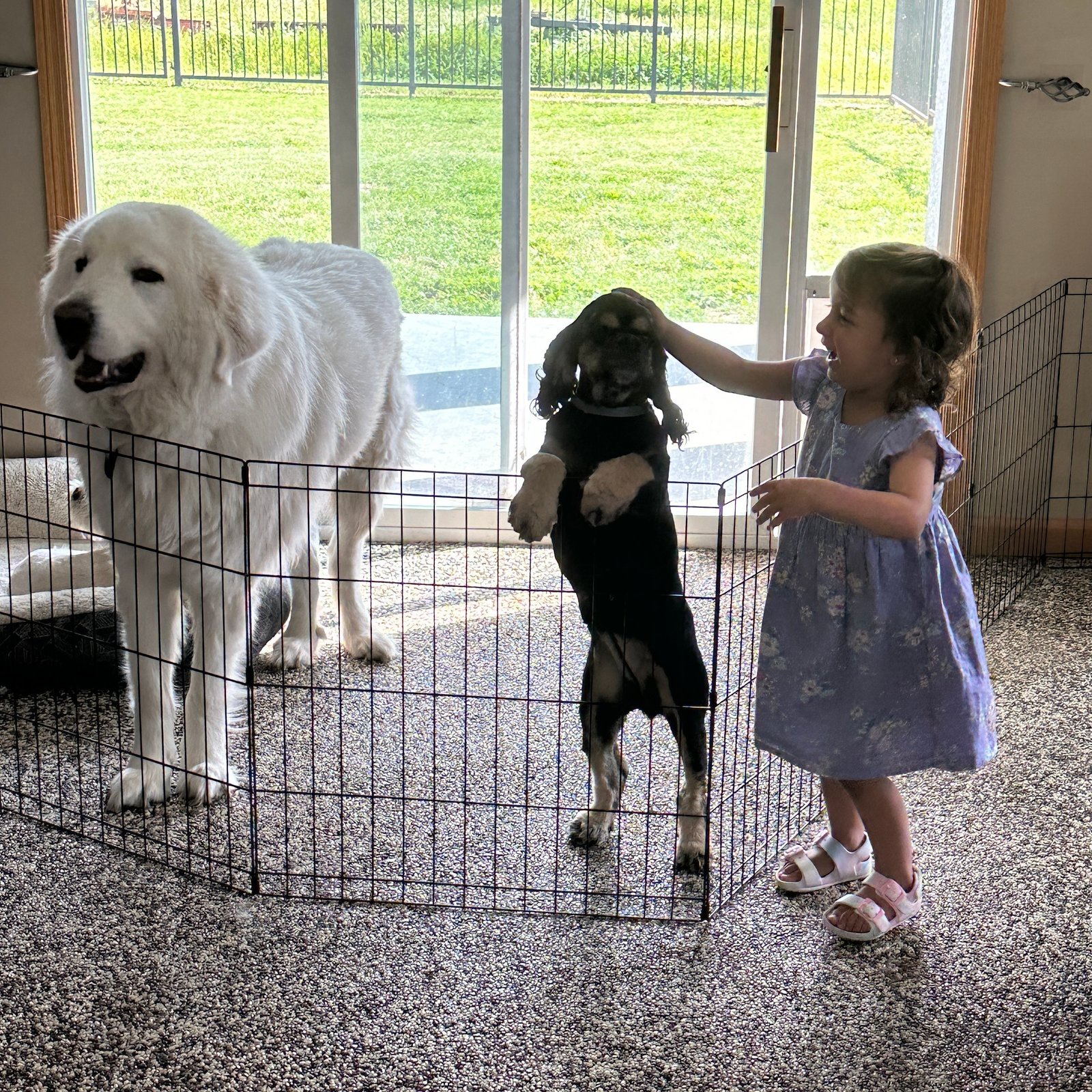
What Proper LGD Socialization Looks Like
Well-socialized livestock guardian dog puppies should:
- Eagerly approach humans for interaction
- Accept handling of all body parts without stress
- Respond to “puppy, puppy” (the puppy call) and human voices
- Show confidence with various people and experiences
- Return to livestock focus when human interaction ends
- Demonstrate a calm, happy demeanor during all interactions
Puppy socialization red flags to watch for from breeders:
- Puppies that avoid or fear human approach
- Puppies are kept locked away from family members and visitors (often secluded in barn stalls, kennels or small pens)
- Stress responses to basic handling
- Excessive shyness, hiding, or defensive behaviors
- No structured human interaction protocols
- “They’ll warm up eventually” attitude from breeders

The Long-Term Benefits of Early LGD Socialization
Proper early human socialization pays dividends for the dog’s entire life:
- Veterinary care happens without sedation or struggle
- Emergency handling is safe for both the dog and humans
- Routine management (grooming, transport, medical care) is stress-free
- Family interactions are positive and appropriate
- Working confidence is enhanced, not diminished

Questions to Ask Any LGD Breeder About Socialization
When evaluating breeders, ask:
- How many different people interact with puppies regularly?
- What specific handling and socialization protocols do you implement
- What puppy socialization programs and courses have they completed
- Do children interact with the puppies regularly?
- Can you show me your socialization program?
- What experiences do puppies have beyond the farm?
Avoid breeders who:
- Minimize human interaction during critical weeks
- Say they “don’t need to buy a course or program” to learn how to raise their puppies
- Claim human socialization “ruins” working dogs
- Have no structured visitor programs
- Keep puppies isolated from diverse human contact
- Can’t explain their socialization protocols

Coming Next Week
Next week, we’ll explore our advanced livestock integration program that transforms curious observers into confident working partners. You’ll learn how physical interaction with specially selected “puppy trainer” livestock creates the deep bonds that make exceptional livestock guardians.
Ready to reserve your properly developed guardian? Apply for our waiting list – spots filling quickly

